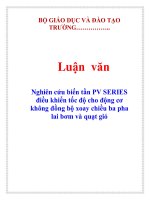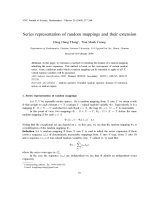Alchemy Series
Bạn đang xem bản rút gọn của tài liệu. Xem và tải ngay bản đầy đủ của tài liệu tại đây (5.31 MB, 5 trang )
International Journal of
Transpersonal Studies
Volume 34
Iss. 1-2 (2015)
Article 13
1-1-2015
Alchemy Series
Ellen Questel
Private Practice
Follow this and additional works at: />Part of the Art Practice Commons, Philosophy Commons, Psychology Commons, and the
Religion Commons
Recommended Citation
Questel, E. (2015). Questel, E. (2015). Alchemy series. International Journal of Transpersonal Studies, 34(1-2), 94–97.. International
Journal of Transpersonal Studies, 34 (1). />
This work is licensed under a Creative Commons Attribution-Noncommercial-No Derivative Works 4.0 License.
This Special Topic Article is brought to you for free and open access by the Journals and Newsletters at Digital Commons @ CIIS. It has been accepted
for inclusion in International Journal of Transpersonal Studies by an authorized administrator of Digital Commons @ CIIS. For more information,
please contact
Alchemy Series
Ellen Questel
Private Practice
West Arlington, VT
As medieval alchemists did not distinguish between psyche and matter, so too the artist, the
images, and the materials of art are partners in the process of revealing. The artist shares her
process of working with the archetypal images presented here.
Keywords: art, alchemy, Jung, mixed-media, symbolism
S
trong feeling tone suffuses my artwork, whether
landscape or symbolic abstraction. Although my
landscapes focus ostensibly on the outer world,
they serve as the departure point from which to explore
mood and quality of place through the medium of pastel
(see />Landscapes.html). The subject matter of my Alchemy
Series derives from the inner landscape (see http://
ellenquestel.com/ellenquestel.com/Alchemy_Series.
html). While a number of the images in the series may
seem familiar or archetypal, most have in fact appeared
to me over the years spontaneously and intuitively,
originating in dreams or meditation. Only after a
number of such experiences did I discover alchemy and
Jung’s (1967/1983, 1967/1983, 1963/1989) extensive
studies on the subject. I was deeply affected by Jung’s
work: many of the alchemical images explored in his
writing corresponded with the strange, and at times
disturbing, images that I had encountered in my own
psyche; and his approach to alchemy as metaphor for
psychic transformation provided me with a conceptual
framework in which to contain these experiences.
My interest in alchemy continued to grow over
many years, and recently I decided to explore the subject
in my artwork. Upon beginning the series, I knew only
that I wanted to create visual images linked to broad
archetypal themes running through the work of the
medieval alchemists and later examined by Jung. My own
process of exploration and experimentation was, as the
alchemical tradition itself, nonlinear. I knew only that
I felt immersed in some of the great alchemical themes:
spirit in nature; microcosms; stages of differentiation and
transformation in nature; and cycles of birth, death, and
rebirth.
As I began to work, I imagined jewel-like
and precious objects in the spirit of medieval icons
and miniatures. For this I needed to teach myself new
94
technical skills such as how to apply gold leaf to paper
and then how to create a surface on the gold leaf that
could receive other media such as pastel and gouache.
This exploration of materials and processes was
lengthy and made me feel as though I were in my own
alchemical laboratory. The resulting surfaces demanded
that I work in an entirely new way and determined the
outcomes in unexpected ways. I felt as if the materials
themselves participated in equal partnership with
my conscious intention, imparting to each image a
mysterious quality suitable to the obscure and enigmatic
nature of the alchemical texts.
There are twelve images in the Alchemy Series,
rendered in various degrees of abstraction. Some of the
images have been with me for years; others appeared as
I contemplated certain alchemical ideas. The crow came
first (Figure 1). I have had a longtime interest in and
affinity for crows and they have appeared to me more
than once in dreams. Additionally, in medieval alchemy
the crow (or raven) and the crow’s head (caput corvi)
are synonymous with the nigredo, the beginning of
the alchemical opus that is characterized by confusion,
darkness, and chaos. (Medieval alchemists did not
distinguish psyche and matter; the nigredo described
both the chemicals in the retort and state of mind of
the adept.) Jung (1963/1989) saw the nigredo as a
profound metaphorical description of the first stage of
the individuation process, equivalent of the dark night
of the soul (see p. 508).
The image of the feather (Figure 2) appeared
as I pondered transcendence and airiness, suggesting to
me the alchemical operation of separatio, where spirit
and matter are temporarily separated. As with the other
images, the particular feather that emerged developed its
unique shape as I worked. I found I was pleased that it
came out tattered, as if having been through a difficult
journey. This was, however, a later reflection, as were
International Journal of Transpersonal Studies
Studies, 34(1-2), 2015, pp. 94-97
Questel
Figure 1. “Alchemy 1," Gold leaf, gouache, and pastel, 9 x 7 ¾ in.
Alchemy Series
International Journal of Transpersonal Studies 95
Figure 2. “Alchemy 8”, Gold leaf, gouache, and pastel, 8 ¼ x 7 in.
96
International Journal of Transpersonal Studies
Questel
associations to the evolution of birds from earthbound
creatures, and associations to the crow itself. Even now,
as I continue to reflect upon each image in the series,
unexpected connections, feelings, and poetic associations
continue to emerge; I hope these images provide a similar
resonance for the viewer as well.
published by Floraglades Foundation, and serves as the
official publication of the International Transpersonal
Association. The journal is available online at:
www.transpersonalstudies.org and in print through
www.lulu.com (search for IJTS).
References
Jung, C. G. (1983). Psychology and Alchemy. H. Read
et al. (Series Eds.), The collected works of C.G. Jung
(R.F.C. Hull, Trans.) (Vol.12). Princeton, NJ:
Princeton University Press. (Original work published
1953)
Jung, C. G. (1983). Alchemical Studies. H. Read et al.
(Series Eds.), The collected works of C.G. Jung (R.F.C.
Hull, Trans.) (Vol.13). Princeton, NJ: Princeton
University Press. (Original work published 1967)
Jung, C. G. (1989). Mysterium Coniunctionis. H. Read
et al. (Series Eds.), The collected works of C.G. Jung
(R.F.C. Hull, Trans.) (Vol. 14, 2nd ed., p. 508).
Princeton, NJ: Princeton University Press. (Original
work published 1963)
About the Author
Ellen Questel, PhD, is a Jungian-oriented psychotherapist,
academic psychologist, studio artist, and a specialist
in visual imagery. Drawing from a cross-disciplinary
background in art history, theoretical psychology,
Jungian studies, and her work as psychotherapist and
artist, she has led seminars on visual thinking, symbolic
imagination, dream imagery, alchemy, and the perceptual
basis of language and thought. She currently leads dream
workshops in southern Vermont where she lives. In 2014,
she presented her Alchemy Series at the Science, Art and
the Sacred course at David Peat’s Pari Center for New
Learning in Italy. She works with pastel, mixed media,
and printmaking (www.ellenquestel.com). Her art is
shown regularly in juried exhibitions.
All images are copyrighted © by Ellen Questel.
About the Journal
The International Journal of Transpersonal Studies is a
peer-reviewed academic journal in print since 1981. It is
sponsored by the California Institute of Integral Studies,
Alchemy Series
International Journal of Transpersonal Studies 97









